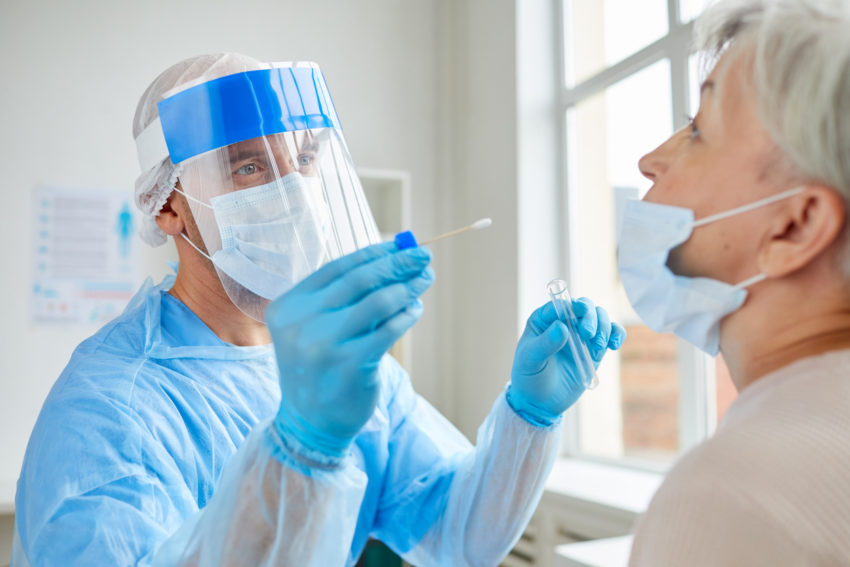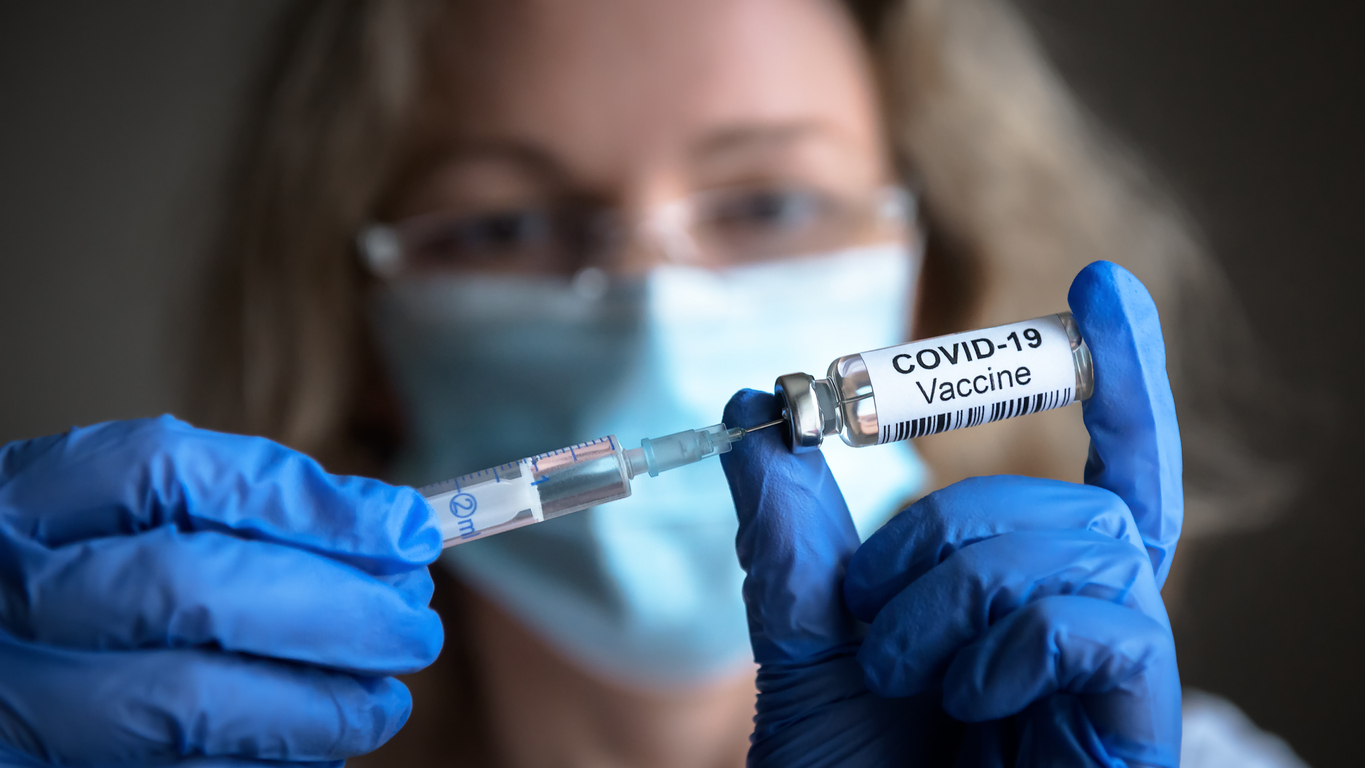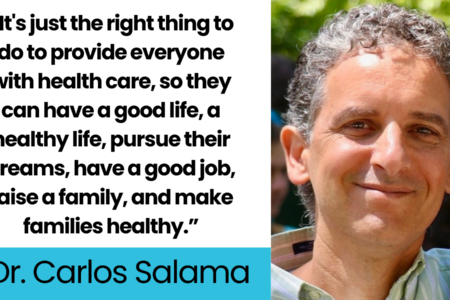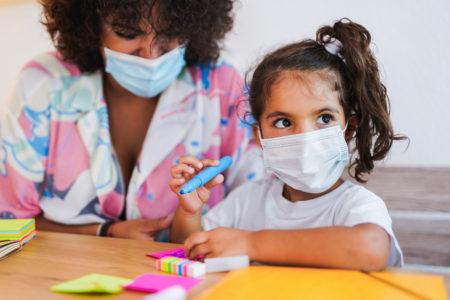
Share On Social!
Across the country, COVID-19 cases are on the rise again, despite the vaccine being widely available.
This due to the delta variant, a mutation of COVID-19 that is highly contagious.
But what does the rise of the delta variant mean for Latinos, those who are vaccinated and those aren’t?
Learn the important facts about the delta variant and how Latinos can stay safe.
What is the Delta Variant?
The delta variant is a highly contagious strain of COVID-19 that was first identified in India and has spread across the world.
“The Delta variant is the fastest, fittest and most formidable version of the coronavirus that causes COVID-19 the world has encountered, and it is upending assumptions about the disease even as nations loosen restrictions and open their economies, according to virologists and epidemiologists,” according to Reuters.
Symptoms of the delta variant are the same as regular strain. These include cough, fever, and potential loss of smell.
While the delta strain is not necessarily more deadly than the regular COVID-19 strain, its contagious nature has the potential to overwhelm hospital systems, which can lead to more deaths.
The CDC believes the delta variant is causing most new cases in the U.S.
Does the COVID-19 Vaccine Protect Against the Delta Variant?
For the most part, yes.
97% of people hospitalized with COVID-19, including those with the delta variant, are unvaccinated.
COVID-19 transmission is very unlikely for vaccinated people. When it does occur, most people have very mild symptoms.
“When a vaccinated person tests positive for COVID-19, most either have no symptoms or have very mild symptoms, and it rarely results in hospitalization or death. Their symptoms are more like those of a common cold, such as cough, fever or headache, with the addition of significant loss of smell,” according to UC Davis Health.

It’s important to know that the vaccine only protects against the delta variant if a person is fully vaccinated before coming into contact with the virus.
“When they come into the (hospital) system, they say, ‘Can I get vaccinated?’ And at that point, you can’t,” said Alix Zacharski, an intensive care clinical nurse manager at Miami’s Jackson Health System, according to CNN.
That’s why it’s important to get vaccinated to prevent the spread of COVID-19, because even if vaccinated people are infected, they are much better off than unvaccinated patients.
How does the Delta Variant Affect Latinos?
Latinos are at high risk of contracting the delta strain due to low vaccination rates in Latino communities.
Latinos make up a low percentage of those getting vaccinated in each state, according to data from state health departments.
For example, in Colorado (22% Latino), more than half of all residents are fully vaccinated.
But the rates for Latinos is largely different from other racial/ethnic groups, according to Al Día News.
“Only a quarter of the Hispanic population had received a vaccine as of June 28, according to the Kaiser Family Foundation. By this time, White and Black populations in Colorado were well ahead, with vaccination rates of 44% and 58% respectively. With Delta ravaging through unvaccinated communities, it is concerning for Latinos that 75% of all new cases in the state are traced to the more transmissible variant,” writes Oscar López for Al Día News.
Latinos have also been targeted by myths and misinformation about the vaccine, which contributes to low vaccine uptake and confidence.
“Latino communities have to continue to combat misinformation about the vaccine and offer more sites to receive the shots before they continue to suffer the impacts of the pandemic,” López said, according to Al Día News.
What Can We Do to Fight the Delta Variant and Stop the Spread of COVID-19?
It’s up to each of us to keep our families and communities safe from COVID-19.
One thing we can all do is get vaccinated against COVID-19.
You can find COVID-19 vaccine locations near you at Salud.to/findvaccine.
You can also make sure to continue practicing safety precautions, no matter your vaccination status, especially since the CDC recommends that everyone continue to wear masks indoors, as of July 27, 2021.
- Wear a face mask—and care for it properly.
- Avoid public places, or at least get together safely.
- Know what to do if you’re exposed or test positive.
Make sure you know misinformation when you see it and can help educate others about the facts on COVID-19.
If you or anyone you know is still hesitant about getting vaccinated, read these stories from real Latinos who had a #VaccineChangeofHeart and decided to get the vaccine after initially being against it.
You can also check out the “Juntos, We Can Stop COVID-19” digital communication campaign from Salud America! at UT Health San Antonio. This campaign was made to help Latino families and workers take action to slow the spread of COVID-19.
The #JuntosStopCovid campaign features culturally relevant fact sheets, infographics, and video role model stories to encourage Latinos to change their public health behaviors.
Share the campaign with your friends, family, and colleagues!
By The Numbers
142
Percent
Expected rise in Latino cancer cases in coming years




[…] The pandemic is another chapter in the bitter story of American racism and inequality. Black and Latinx people are being infected and are dying at much higher rates than white Americans. Many people of […]
[…] coronavirus has killed over 61,000 Latinos in America according to the CDC, accounting for over 18.2% of the total COVID deaths in the […]
[…] Whereas Hispanics make up 11% of D.C.’s inhabitants, they signify 19% of the COVID cases, and 14% of the deaths. Equally, 46% of D.C.’s residents are Black, they usually make up an alarming 75% […]
[…] and historical mistreatment. According to the U.S. Centers for Disease Control and Prevention, Latino and Black American communities are three times more likely to become infected with […]
[…] Covid pandemic has hit the Latino community particularly hard, and data from the nonprofit health equity advocacy group Salud America! shows Latinos lead in the 0-24 age […]
[…] the pandemic, Latinos took major blows, both in terms of COVID-19 cases and also from the economic recession under former President Donald Trump. Nearly half (49%) of […]
[…] the positive trend, the harm may have already been done. The pandemic has disproportionately impacted Latino communities. Reuters reported that election-related or political disinformation that […]
[…] pesar de la tendencia positiva, es posible que el daño ya esté hecho. La pandemia ha impactado desproporcionadamente Comunidades latinas. Reuters informó que la desinformación política o relacionada con las […]
[…] residentes blancos muestran una tasa mucho más baja con 10 muertes por cada 100,000 habitantes(8 9) . Los afroestadounidenses por su parte, denuncian subsistemas de salud que les segregan […]
[…] https://salud-america.org/coronavirus-case-rates-and-death-rates-for-latinos-in-the-united-states/ […]
[…] https://salud-america.org/coronavirus-case-rates-and-death-rates-for-latinos-in-the-united-states/ […]
[…] communities have the second-highest number of COVID-19 cases in the U.S. They’re also more likely to become hospitalized and die from the disease than other […]
[…] total, around 160,000 Latinos were killed by COVID-19. This accounts for 16% of the 1 million deaths in the country. The […]